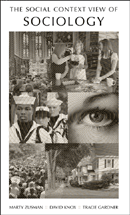The Official
Journal of
The North
Carolina
Sociological
Association: A
Peer-Reviewed
Refereed Web-Based
Publication
ISSN 1542-6300
Editorial Board: Editor: George H. Conklin, North Carolina Central University Board: Bob Davis, North Carolina Agricultural and Technical State University Richard Dixon, UNC-Wilmington Ken Land, Duke University Miles Simpson, North Carolina Central University Ron Wimberley, N.C. State University Robert Wortham, North Carolina Central University
Editorial Assistant John W.M. Russell, Technical Consultant
Submission
Guidelines
for
Authors
Cumulative
Searchable
Index
of
Sociation
Today
from
the
Directory
of
Open
Access
Journals
(DOAJ)
Sociation Today
is abstracted in
Sociological Abstracts
and a member
of the EBSCO
Publishing Group
The North
Carolina
Sociological
Association
would like
to thank
North Carolina
Central University
for its
sponsorship of
Sociation
Today
 ®
®
Volume 6, Number 2
Fall 2008
Book Review of: The Social Context View of Sociology
by
Joseph Kaminski
Brooklyn College/Indiana
University Northwest
The Social Context View of Sociology by Marty E. Zusman, David Knox, and Tracie Gardner (2009) is an introductory sociology textbook published by Carolina University Press (ISBN 978-1-59460-572-7).
The Social Context View of Sociology is an enormous asset for teaching introductory level students the ideas and arguments with which sociologists regularly grapple. The book allows for the reader to grasp key concepts such as gender, class, and social order at their own pace. The book does not present confusing charts or other digressions that may trouble the first year social sciences student. Instead, it offers a concise discussion of what constitutes the core of contemporary sociology.
This textbook really helped me structure my introductory to sociology course. As a first time instructor of this course I was nervous, especially since my formal training is in political science. After reading through the book before the course began, I realized I had a solid guide to help me navigate through material I had not read since my undergraduate studies.
Zusman, Knox, and Gardner effectively introduce fundamental concepts in a straight forward and clear way. The first part of the book clearly outlines key sociological theories and terms. Students are taught the different forms of organization that make up our constantly changing society. As the book progresses, students are introduced to the notion of culture and how values and norms evolve within societies. Towards the end of the book, students are introduced to social class, race, ethnicity, family, and gender.
This book also effectively emphasizes the importance of groups and communities. The book allows for the instructor to make an easy transition to in class discussions of real life situations that students face on a daily basis. In the class I teach using The Social Context View of Sociology, we spent over half an hour discussing the role and nature of the fraternities and sororities, and how they impact social life and events on campus. Students found this to be not only interesting, but something they can relate to on a personal level. Many students shared interesting stories, showing the critical thought provoking nature of the text.
Zusman, Knox, and Gardner really do a terrific job of emphasizing the different approaches and theories held in regard to education. They show that there is not one specific paradigm, rather that there is some value to all schools of thought. Students are given concrete numbers to look at regarding disparities among the achievements of students of different racial backgrounds. After reading the section on education, students should have a better understanding of their own personal educational path and goals. It offers students a chance to be reflective on their own learning experience.
The Social Context View of Sociology is constructed in a way that allows for the instructor to pick and choose chapters in correlation to the rest of their course. For example, when discussing the nature of gender relations, ones needs only to turn to Chapter 9 where an in depth discussion about the three main theories (conflict, functionalism, and interactionism) of gender and gender inequality are clearly stated. Students are introduced to critical concepts such as ageism, feminization of poverty, and occupation sex segregation. Theories and their original authors are discussed, thus allowing the students their own further exploration upon a topic they may find interesting.
Along with allowing the instructor great flexibility for introducing topics, this book contains up to date and current examples that help students to associate themselves with the social and political processes that surround them. One such example mentioned in the text is that of war profiteering and the relation between political institutions and big business. "When Dick Cheney makes an announcement supporting the war in Iraq, one wonders the degree to which he profits from the war through private contracts with companies (Halliburton) with whom he had an association." From such a statement, students would be intellectually intrigued to find out more about possible corruption and underhandedness within our own political system.
The book concludes
nicely with a discussion of how socialization leads to the formation of
political structures and economic systems. Zusman, Knox, and Gardner
give a fair assessment of the bureaucratic elements inherent in western
industrial society. Students are shown how society is dependent upon
various institutions that often have divergent interests. After finishing
the book, students will have a new outlook on the importance of the complex
social arrangements that shape our daily lives that are so often taken
for granted. This is an excellent introductory book that also fits
within the budget of the student with limited economic resources.

To go to the other view of
this textbook, click here please.
Return to Sociation Today
Fall 2008
©2008 by the North Carolina Sociological Association